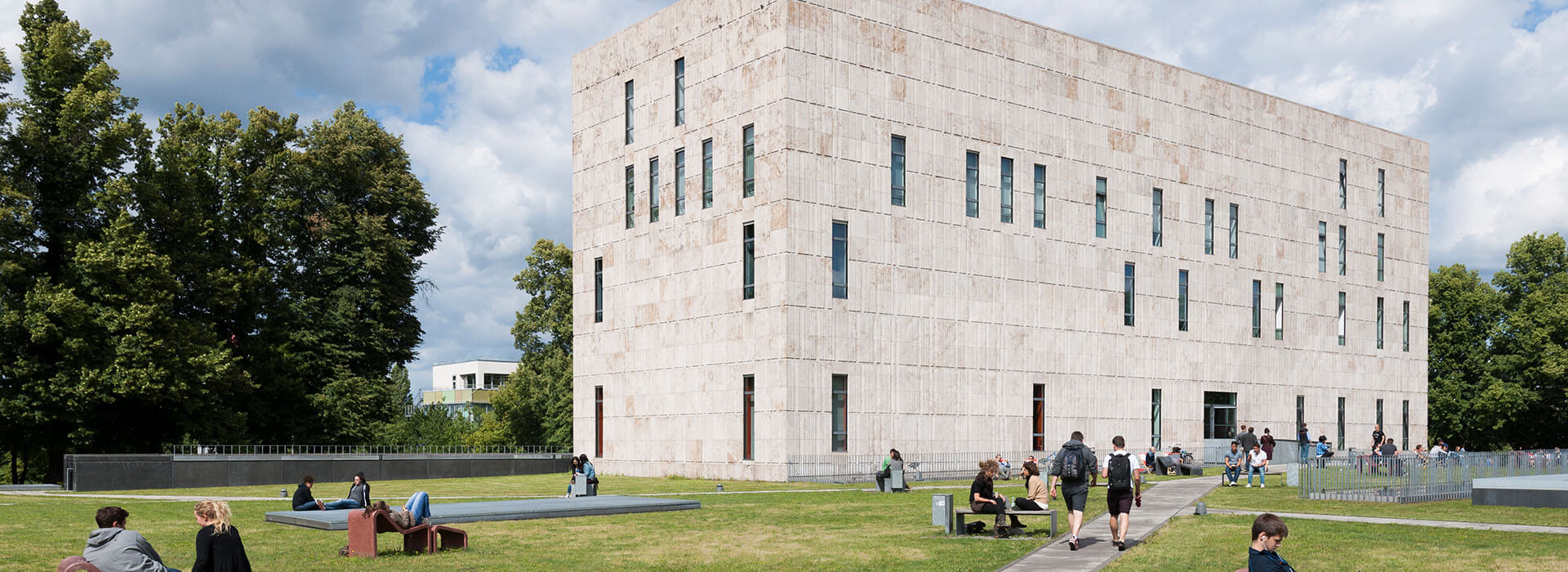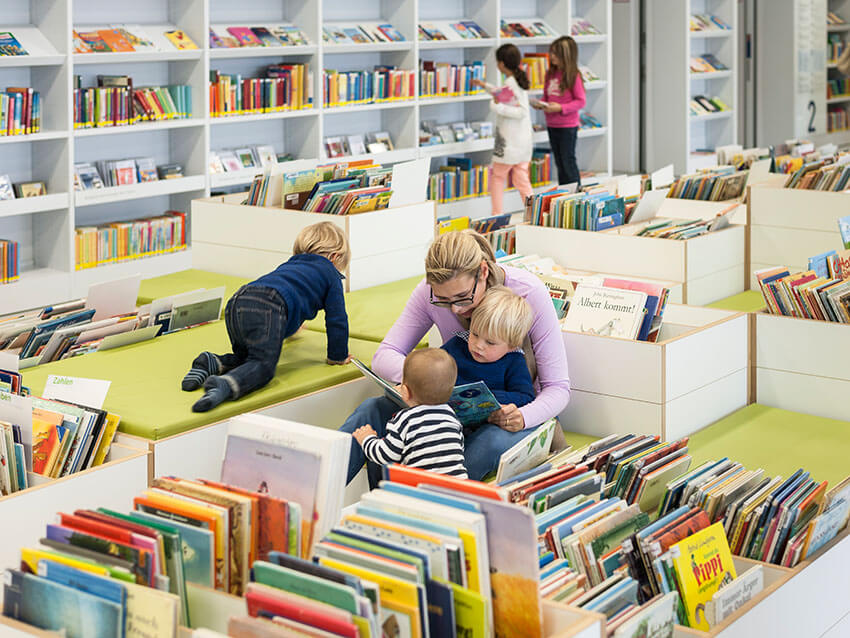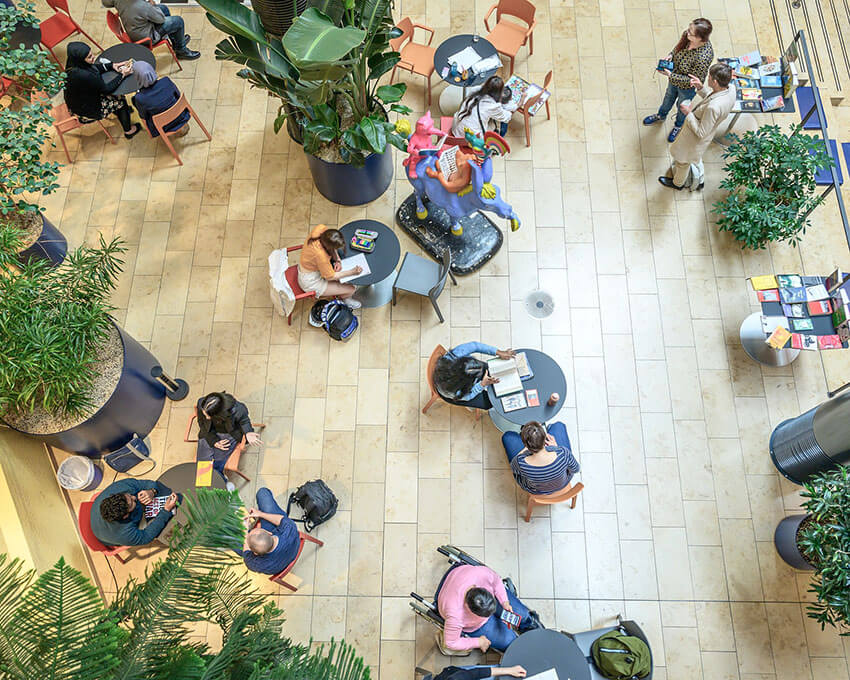
© dbv / Thomas Meyer
Library – Your diverse place to work
Start a new chapter –
shape the world of tomorrow.

Library – A place to work with meaning, mind & heart!
Libraries are essential for a democratic society. They stand for freedom of expression and information, offer space for discourse and debate, and they curate independently and neutrally according to professional standards. Libraries are open places, promote experiments, support lifelong development, promote equal opportunities, network people and media and cooperate internationally. In summary: They are an essential building block of a living democracy.
The library career field offers an exciting opportunity to work in a dynamic environment and promote freedom of information. Here you can support education and research and combine them with personal interests. You work in a global community, share ideas and continually learn. Regardless of whether you training , completing degree are a career changer , libraries offer you an inspiring career. Become part of the team that shapes the world of knowledge and promotes education!
Library – Here we write today and tomorrow.
Knowledge preparation & preservation
Libraries are places where knowledge is collected, organized and made available. They therefore represent the value of education and lifelong learning.
Diversity & Respect
Libraries promote diversity and tolerance by welcoming, respecting and providing space for people and ideas from different backgrounds. They stand for openness, inclusion and the appreciation of diversity in our society.
Sustainability & Environment
Libraries are naturally sustainable because they provide resources and books for multiple use and commit themselves to sustainability in terms of work organization and user conditions. They support initiatives such as "paperless studying" and regularly check their energy -saving measures.
Digitalization & Technology
Libraries per se promote digitalization by offering access to current digital resources. Data security and modern technologies go hand in hand to create optimal research conditions. Digital management is not only practiced, but also taught in training courses to strengthen digital skills.
Democracy & Responsibility
Libraries represent democracy and responsibility by enabling free access to information, providing quality resources, supporting education and promoting freedom of expression.
Equal opportunity
Libraries in Germany.
Library staff take on a wide range of tasks to ensure smooth operations. They assist users in obtaining information and media management, organize events and take care of administrative matters. Additionally, they help strengthen the library in the community by using marketing and social media to increase access to knowledge and position the library as an important community resource. Libraries support education, study and research, including research organization, and are indispensable for academic life.
The library landscape in Germany is just as diverse as the tasks of the library employees. These institutions play an important role in society and are part of an international network. You acquire, secure and impart knowledge and initiate a wide range of projects, thereby having a positive impact on political and social developments in democracies.
What are academic libraries?
Academic libraries, such as university, college and state libraries, the national library and central specialist libraries, as well as special libraries, include (inter-)national collections for various areas of knowledge. They specifically address the needs of students, researchers and teachers, provide research support and provide research infrastructure.
What are public libraries?
Public libraries are central institutions based on the principle of free access to information, a concept anchored in fundamental rights. They ensure free access to books, magazines, digital media and more, promote culture and education as well as the democratic exchange. As a “third place”, they offer an inviting, consumption -free environment. Public libraries support lifelong learning, the development of reading and media literacy and contribute to equal opportunities. They also offer a wide range of events and services. The library services are always aligned with the needs of a changing (city) society.
How are libraries financed?
Libraries receive their financial support from various providers, including the federal government, the federal states and the municipalities. In addition, foundations and bodies of public law can also be carriers of libraries.
The entertainment of a public library is one of the “voluntary tasks” of municipalities. Only a few federal states give state subsidies for the establishment and maintenance of a city or municipal library, so that the financing usually remains exclusively the matter of the municipality. You can get more information about the financial situation of the public libraries here .
For example, university libraries as scientific libraries: the sponsors of the university libraries is usually the respective federal state. Most of these libraries are financed by a household that comes from the budget of the federal state. This household is either set directly for the library and assigned it or is part of the total budget of the entire university.
What funding is available for libraries?
The diversity of libraries in Germany is reflected in equally diverse funding opportunities. At the political level, libraries can receive support within the framework of educational, scientific and cultural funding lines. Both the European Commission and the federal and state governments offer specific funding programs for libraries. In addition, there are foundations under private law that, in accordance with their foundation's purpose, support projects in the area of libraries or projects involving libraries.
Find out more here:
What national and international cooperation opportunities are there for German libraries?
German libraries are integrated into a comprehensive network that offers both national and international cooperation opportunities. These diverse connections help share knowledge, optimize resources and strengthen the role of libraries on a global scale.
Networks: The important national networks include the DINI (German Initiative for Network Information) and the NFDI (National Research Data Infrastructure). The DINI promotes cooperation between university libraries at a national level, while the NFDI offers an infrastructure for dealing with research data. At the international level, Bi-International the exchange between German libraries and international partners, and Bibliotheca Baltica promotes cooperation with libraries in the Baltic Sea countries. In addition, German libraries can establish and maintain international relationships through city partnerships.
National associations: There are numerous national associations active in Germany that promote cooperation and the exchange of knowledge between libraries. These include the BID (Library & Information Germany), the dbv (German Library Association), the BIB (Information Library Professional Association), the VDB (Association of German Librarians), the DGI (German Society for Information and Knowledge), the ekz ( ekz.bibliotheksservice GmbH ), the Goethe-Institut and the IAML (International Association of Music Libraries, Archives and Documentation Centers).
International associations: At the international level, German libraries are represented by membership in various associations, including the IFLA (International Federation of Library Associations and Institutions), which represents the library sector worldwide. EBLIDA (European Bureau of Library, Information and Documentation Associations) and LIBER (Ligue des Bibliothèques Européennes de Recherche – Association of European Research Libraries) also play The NAPLE Forum (National Authorities on Public Libraries in Europe) also promotes exchange at the European level.
…more than 8,000 libraries
…over 25,000 employees
…more than 182 million visits in 2024
…approximately 410,000 events organized in 2024
…more than 270 million physical media items borrowed in 2024
Voices from the library community.
Franziska Neudeck – dbv
Franziska Neudeck - Assistentin der Geschäftsführung, Deutscher Bibliotheksverband e.V. (dbv) Beruflicher...
Nora Neuhaus de Laurel – Bremen City Library
Nora Neuhaus de Laurel - Training and Personnel Development, Bremen City Library. Professional background...
Nicole Webersinn – Frankfurt am Main City Library
Nicole Webersinn - Library Assistant, Frankfurt am Main City Library: Professional Background & Career Path. How and why...
Start your new chapter and find the right job in our library world.

© 2024-2025 MEIN JOB BIBLIOTHEK | Contact
| Imprint | Data protection My job library - a joint project of the associations:











